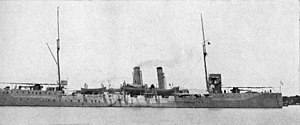Chinese cruiser Chao Ho

Chinese cruiser Chao Ho
|
|
| History | |
|---|---|
|
|
|
| Name: | Chao Ho (肇和) |
| Builder: | Armstrong Whitworth |
| Cost: | £210,000 |
| Laid down: | 7 October 1910 |
| Launched: | 23 October 1911 |
| Completed: | 21 February 1912 |
| Recommissioned: | 31 December 1928 |
| Decommissioned: | December 1923 |
| Struck: | December 1923 |
| Homeport: | Guangzhou |
| Fate: | sunk 28 September 1937 by Japanese Aircraft |
| Reacquired: | 29 December 1928 |
|
|
|
| Name: | Chao Ho (肇和) |
| Acquired: | December 1923 |
| Commissioned: | 5 January 1924 |
| Homeport: | Qingdao |
| Fate: | reintegrated into the Republic of China Navy |
| General characteristics | |
| Class and type: | Chao Ho-class protected cruiser |
| Displacement: | 2,750 t (2,707 long tons) |
| Length: | 105.5 m (346 ft) |
| Beam: | 13 m (43 ft) |
| Draught: | 4.5 m (15 ft) |
| Propulsion: | Three-shaft Parsons steam turbines, 4 cylindrical and 4 Yarrow boilers; 6,000 hp (4,500 kW) |
| Speed: | 20 knots (23 mph; 37 km/h) |
| Range: | 4,500 nmi (8,300 km) at 10 kn (12 mph; 19 km/h) |
| Complement: | 283 |
| Armament: |
|
| Armour: |
|
Chao Ho (Chinese: 肇和; pinyin: Zhào Hé; Wade–Giles: Chao Ho; literally: "Harmonious Beginnings") was the lead ship of a class of her class of training protected cruisers originally built for the Manchu Qing Dynasty.
The Chao Ho class were part of a largely unrealized seven-year modernization program by the Qing Dynasty's imperial regent Zaifeng, Prince Chun that would have ordered a number of modern battleships, cruisers, torpedo boats and submarines. Shortly before the completion of her sea trials and impending induction into the Imperial Chinese Navy, the 267-year reign of the Manchu Qing Dynasty came to an end when Dr. Sun Yat-Sen's Xinhai Revolution forced the abdication of the child-emperor Puyi and created the Republic of China. The Chao Ho would subsequently enter service with the Republic of China Navy.
The Chao Ho-class cruisers were unusual in that all three semi-sister ships were built in different ship building yards, and although all three ships were built to the same basic design, they varied in size, armour and displacement, of which Chao Ho was the largest and longest, and all three ships carried varied assortments of guns (as opposed to uniform main armament). These were done to increase the educational effectiveness of the ships, in order to familiarize their crews with various boiler and weapons systems.
...
Wikipedia
